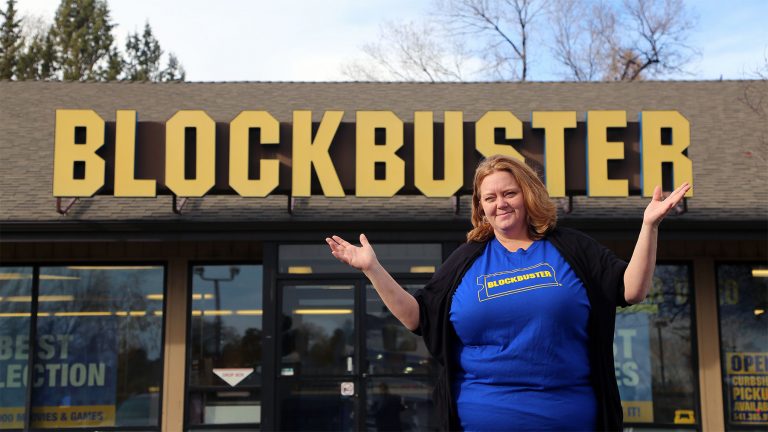
In Making “The Last Blockbuster,” Director Taylor Morden Reminds Us of Many Visit to The Video Store That Made the Screen Come Alive
There was a time, going to the video rental store, was an adventure in and of itself. Without laying out a wad of cash, one could take home armfuls of cinematic pleasure — and as long as you remembered to return them before the late fees kicked in. But from 9000 stores in at the turn of the century, the venerable media distribution vehicle has dwindled down to one remaining store in, of all places, the mid-sized city of Bend, Oregon.
Director/producer Taylor Morden, previously known for two music docs — 2019’s Pick It Up! – Ska in the ’90s and 2017’s Here’s to Life: The Story of The Refreshments — transformed a fascination with Blockbuster’s tragic shrinkage into a feature length doc.
Detailing much of the chain’s complicated demise and the heroic efforts of manager Sandi Hardings’ efforts to keep the Bend, Oregon’s store going, Morden has made a film that tells the tale of fantastic rise and sad fall of a great American entertainment company.
Q: What made you decide to tackle this story about Blockbuster?
Taylor Morden: When I found out there was still a functioning Blockbuster video in my town, I got curious. Who is still renting movies? How are they still open? I thought maybe if I was curious other people would be too.
Q: What fond memories do you have of going to the local Blockbuster as a kid?
Taylor: When I was a kid, we didn’t have a Blockbuster near where I lived, but I could walk to a small gas station that also had a few movies for rent. so as often as I could I would save up loose change and walk to the store and rent a VHS tape. It was a big deal. Later, when I was in College, there was a Blockbuster nearby and I would rent movies all the time, I even had the subscription service where you could rent unlimited movies at one point. It was great!
Q: It’s important to know of Hollywood’s domination over the selling prices of video tape — a studio once was selling videocassettes for $100 — and of the ensuing court battle with the entrepreneur who opposed it were the origins of video rentals. What was it like to find that out?
Taylor: I remember hearing about that a long time ago, about the reason video stores existed because people [originally] couldn’t afford VHS tapes. That made sense to me, I couldn’t really afford VHS tapes in the ‘80s even when they were $20 so renting was always the better option.
Q: Viacom bought Blockbuster for 8.4 billion — was that done as a stepping stone to the acquisition of Paramount Pictures?
Taylor: I wasn’t old enough to be paying attention at that time, but I think it was perceived as a pretty big deal.
Q: In 2004, when Blockbuster peaked, it was so successful that there were 9000 stores in the United States; was that because they had a significant advantage over the emerging Netflix including the product lineup and branding?
Taylor: Blockbuster’s popularity was due to a lot of factors. They had a more streamlined business model than the smaller stores and were able to bully most of their competition out of the way. When Netflix came along, it seemed like Blockbuster thought of themselves as “too big to fail.”
Q: What was the main reason that Blockbuster didn’t buy Netflix when it was possible? And, what’s your opinion of their action?
Taylor: I think they just didn’t think they needed help from anyone. They were so much bigger at the time. Netflix wasn’t streaming yet really, only mailing DVDS so instead of buying Netflix, Blockbuster also started mailing DVDs. I think it was a big mistake, but it would have been very hard for Blockbuster to know that at the time.
Q: I didn’t know that [Bend, Or, store manager] Sandi Harding would bother to visit Target, Wal-Mart, Best Buy and buy new movies at those stores to show their customers new releases — that was quite an effort. What is Sandi like?
Taylor: Sandi is amazing. We fell in love with her while making this movie. If it wasn’t for her hard work in keeping the store going, there wouldn’t be any Blockbusters left.
Q: The reason for Blockbuster’s bankruptcy is thought to be the rise of video distribution services such as Netflix and Amazon, but in reality, it was the economic crisis in 2008 and free charge of postponement of rentals. Did that lead to a significant loss for Blockbuster?
Taylor: There were a lot of factors that lead to the bankruptcy; it’s not 100% due to any one factor. But if there wasn’t a financial crisis in 2008, Blockbuster probably could have recovered and continued on. They also took a big financial hit when they got rid of late fees.
Q: How did you get those celebrities to talk about the Blockbuster? Were these actors and directors people who had previously worked at a video store?
Taylor: We mostly reached out to people who had worked at video stores and other comedians that were big movie fans. When we asked people if they wanted to talk about Blockbuster we were surprised by how many people said yes.
Q: What do you want audiences to take away from this film?
Taylor: Please remember to be kind and rewind.

